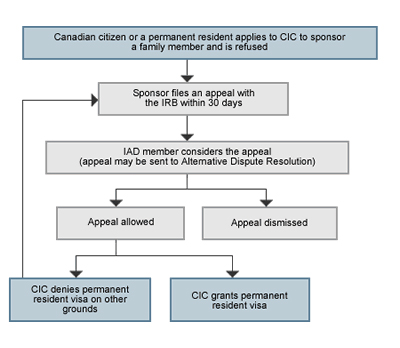Sponsorship Appeal Process
If Citizenship and Immigration Canada (CIC) has refused the application to sponsor the immigration of a close family member to Canada, the sponsor may appeal to the Immigration Appeal Division (IAD) of the Immigration and Refugee Board of Canada (IRB).
Note: A sponsor may not appeal if the family member is inadmissible to Canada because of:
- a serious criminal offence punished in Canada by a term of imprisonment of two years or more
- involvement in organized crime
- security grounds
- violations of human or international rights, or
- misrepresentation (unless the person is the sponsor's spouse, common-law partner or child)
The sponsor has 30 days after the refusal to appeal to the IAD. Some sponsorship appeals go through an informal alternative dispute resolution (ADR) process. In most cases, a member (decision-maker) will hold a hearing of the appeal according to the IRB tribunal process. The appeal process involves two parties: the appellant and Minister's counsel who represents CIC.
If the appeal is allowed and the original decision is set aside, CIC will resume processing the sponsorship application. CIC is bound by the IRB's decision. However, it is possible for CIC to refuse the application on other grounds, and this may also be appealed to the IAD.
 What is alternative dispute resolution?
What is alternative dispute resolution?-
The IAD may suggest that the appeal be decided through alternative dispute resolution (ADR). ADR is only suggested for appropriate cases. This process means that the sponsor and the Minister's counsel will sit down with a dispute resolution officer (DRO), assigned by the IAD, to discuss the case. The DRO will help clarify the issues in the case and encourage both sides to agree on a decision. If ADR is successful, there is no need for a hearing.
Sponsorship Appeal Process



_20170222120920.jpg)